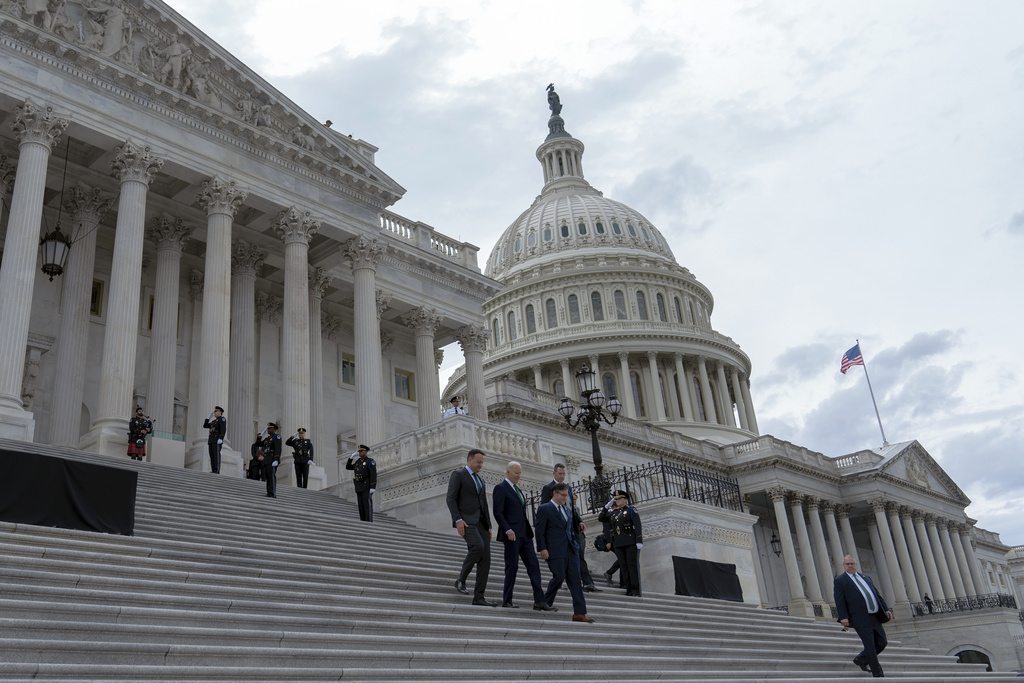From left, Irish Prime Minister Leo Varadkar, President Joe Biden, and Speaker of the House Mike Johnson, R-La., walk down the steps following the annual St. Patrick’s Day gathering at the U.S. Capitol in Washington, Friday, March 15, 2024. (AP Photo/Jose Luis Magana)
WASHINGTON, D.C. – Following up on President Joe Biden’s combative State of the Union Address, the White House released a budget request on Mar. 11 calling for $7.3 trillion in spending for the 2025 fiscal year.

In the rosy picture painted by White House officials, Biden’s budget would create new social programs for housing, health care and childcare while reducing the national deficit by $3 trillion over the next decade through new taxes.
On the House Budget Committee, Rep. Blake Moore (R-UT) called the President’s budget a recipe for disaster, complete with tax hikes, inflationary spending and steep deficits.
“We are the only nation that has emerged from every crisis we have entered stronger than when we went in,” Biden argued in a cover letter attached to his budget proposal. “While my administration has seen great progress since day one, there is still work to do. My budget will make that promise real.”
Biden’s budget recommends funding new social programs by raising tax revenues by $4.9 trillion over the next decade while cutting the federal deficit by $3 trillion over the same period.
Those seemingly contradictory goals would be accomplished by raising the corporate tax rate from the current 21 percent to 28 percent; raising the minimum tax on the largest billion-dollar corporations from 15 percent to 21 percent; imposing a 25 percent minimum tax on Americans earning more than $100 million annually; denying tax deductions for corporations that pay any employee more than $1 million; and, plugging a tax loophole for owners of corporate jets.
House Speaker Mike Johnson (R-LA) called the President’s budget proposal “a road to accelerate American decline.”
Moore agrees, saying that higher taxes and inflated price are exactly what hardworking American families don’t need right now.
“President Biden’s budget falls far short of addressing the many challenges caused by runaway spending,” Moore said.
In a prepared statement released on Mar. 14, Moore explained that the Biden budget would add $18.2 trillion to the national debt over 10 years, boosting that total to a staggering $52.7 trillion by 2034.
That short-sighted proposal would also impose the largest tax increase in the nation’s history ($4.9 trillion); spend an unprecedented $86.6 trillion over 10 years; and, grow the gross federal debt by 25 percent more than the economy.
What America need now, Moore argued, is to adopt the spending plan for fiscal 2025 that was recently passed by the House Budget Committee to cure Washington’s spending addiction and counter policies like Biden’s that worsen the nation’s economic outlook.
“Our budget proposes no new taxes, grows the economy over three times faster than the debt, balances the budget in 10 years and spends $15.1 trillion less than the President’s budget,” he emphasized.
Moore also said that the Budget Committee’s resolution would also create a path to reduced spending and deficits, bolster economic growth and bring some sense of fiscal responsibility back to Washington.
While congressional observers acknowledge that Biden’s budget proposal has zero chance of being accepted by the Republican-controlled House of Representatives, it lays out Biden’s talking points in his 2024 re-election bid and stakes out the President’s position in contrast to former President Donald Trump’s appeals to working-class voters.

